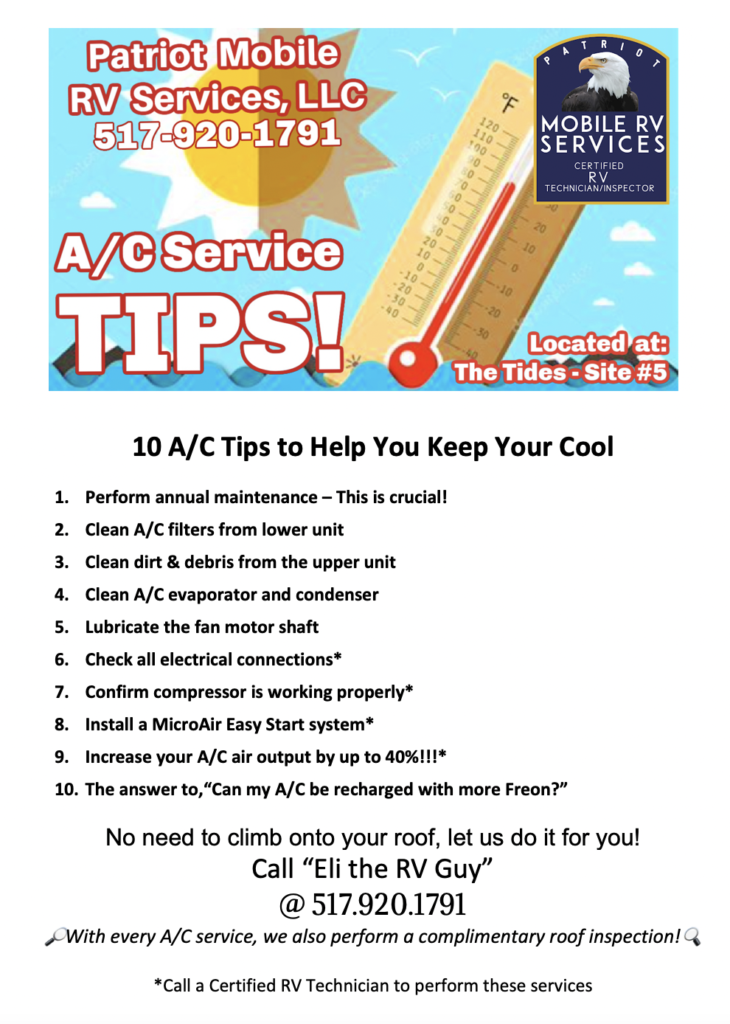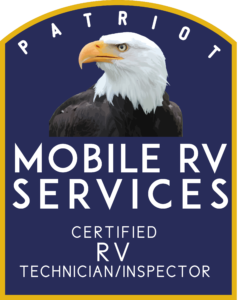😎 A/C Tips to Help You Keep Your Cool! 😎
❄️❄️❄️❄️❄️❄️❄️❄️❄️❄️
Florida weather can be very taxing on your RV. RV techs get a lot of calls concerning air conditioners and the proper procedure to keep them running at their optimal performance. Recently, I was asked by a customer if it were possible to make the air cooler and more efficient. (By the way, yes, it is!) I thought I would put together these helpful tips to be of help to you. Some of these can be done by most RV owners, however, some should be performed by a certified RV tech of your choice.
Hope this helps!

- Perform Annual Maintenance
Just like anything else, annual upkeep is important. There are several things that should be performed on a regular basis. Not sure where to start? Your A/C owner’s manual would be a good place to start. Many of us are not prone to read this material, but it is important. Get to know what your manufacturer recommends and schedule these things to be completed.
- Clean A/C filter from the lower unit
This may sound like a small thing but it is important. These filters seem insignificant but they are necessary. They prevent excess dust and dirt from entering the air intake. The cleaner the air is, the better your A/C will run. If, by chance, you do not have air filters, it is recommended to have them installed.
- Clean dirt & debris from the upper unit
The upper unit is the A/C portion on your roof. If you are not comfortable climbing on your roof, please have a qualified RV tech do this for you. It is unbelievable what can collect under the A/C cover on the roof. I have found leaves, pine needles, mud daubers, wasp nests, spider nests, dirt and debris.
- Clean A/C evaporator and condenser
While you’re cleaning debris from the upper unit, it’s a good time to clean the
evaporator and condenser coils. Clean the coils with a soft brush and A/C coil
cleaner, then rinse with water. Water should run through the drip pan and freely
off the roof.
- Lubricate the fan motor shaft
Ensure the fan motor freely spins without obstruction. It is recommended to use a dry spray lube on the fan shaft to ensure free movement.
(It is recommended to have a certified RV tech perform the rest of these tips)
- Check all electrical connections
Let’s face it, our RV’s go through a lot while traveling the roads. Connections, contacts and junctions can wiggle loose. It’s good practice to make sure everything is tight and secure. Water is notorious for causing havoc to RV electronic components. It is recommended to check for corrosion and any visual evidence of water damage.
- Confirm compressor is working properly
The compressor is the “heart of the A/C” and needs a check-up annually. There are specific tools for certain tests that an RV tech can do to make sure your compressor is running properly or diagnose an issue. It would be wise to have these tests performed to ensure proper operation.
- Install a MicroAir Easy Start system
This is an optional upgrade. Easy Start systems allow your compressor to “start up” with less power, thus, taxing your electrical system less. However, it is especially helpful if you have more than 2 A/C units. It can cause less tripped breaker issues (if you find that to be an issue) when running all three units at the same time.
- Increase your A/C air output by up to 40%!!!
As mentioned above, I had a customer ask about increasing the efficiency of his A/C. This can be done with a little work in the A/C lower unit. It is a pricey modification for a manufactured kit at around $180 per A/C, but it will direct air more efficiently throughout your rig and will make the best use of the cold air your RV is producing. I custom made one for much, much cheaper. Once again, this is an intermediate modification that an RV tech can help you with.
- Answer to the Question, “Can my A/C be recharged with more Freon?”
This is a question that all RV techs get. The short answer is “no” and I’ll tell you why. RV A/C’s are not equipped with the proper ports to add the Freon. Also, there are special certifications and equipment a tech must have in order to add these ports. The expense to have what is needed does not make it practical for a technician to do. Lastly, you have to ask yourself, “why would you want to do this?” There is an underlying reason the original Freon leaked out. This leak could be anywhere in an already compromised system. Unless this leak is found, it will do no good.
I hope these tips have been useful in providing information about your RV’s A/C maintenance and operation. If it has been of value to you, we’d love to have you *Like* our Facebook page for more great tips. If we can be of service to you, call “Eli the RV Guy” at 517-920-1791 to schedule an appointment.
